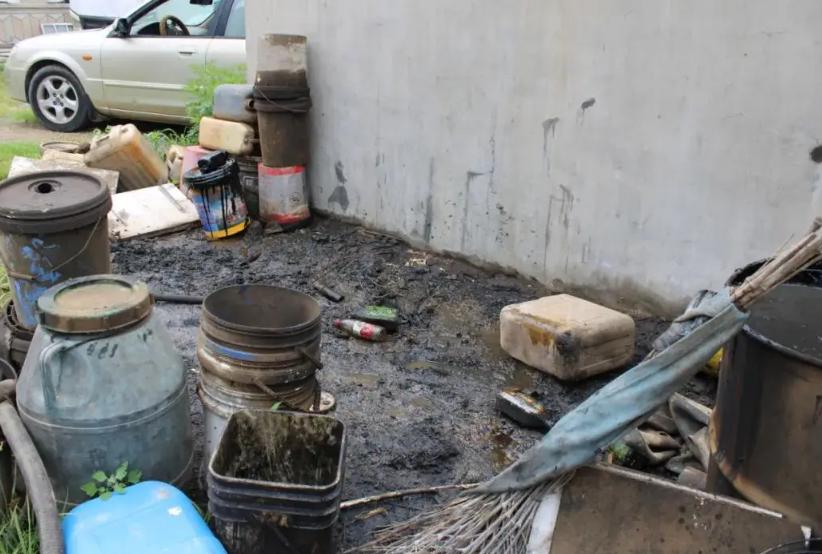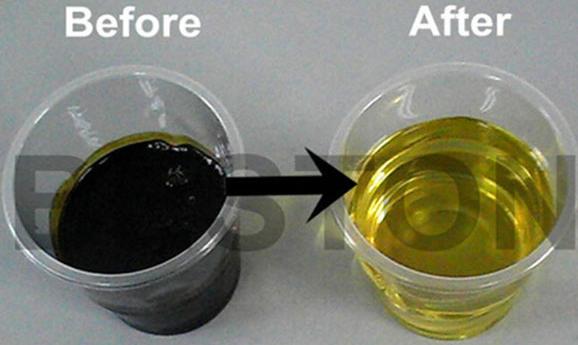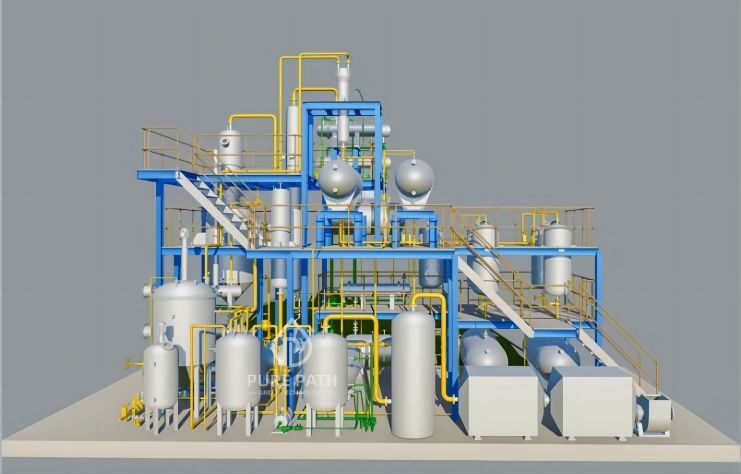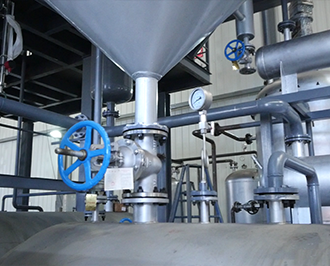How Used Oil to Diesel Conversion Reduces Environmental Pollution
Improper disposal of waste engine oil is a critical environmental problem, causing soil contamination, water contamination, and health hazards. Fortunately, modern technologies like used oil to diesel conversion offer a sustainable and eco-friendly solution. This process not only mitigates environmental harm but also creates a valuable fuel source. The article explains how the used oil to diesel conversion reduces pollution and the merits of establishing a used oil to diesel plant.
The Environmental Harm of Used Engine Oil

Waste engine oil is a hazardous waste product that, if not correctly disposed of, can cause severe environmental damage. As engine oil circulates through an engine, it picks up dirt, heavy metals, chemical additives, and combustion by-products. The oil wears out over time and loses its effectiveness, and thus must be changed. Unfortunately, millions of gallons of waste engine oil are improperly discarded annually, with a significant amount of it being poured down drains, onto the ground, or into waterways.
The ecological harm is overwhelming. When tossed on land, it leaches into the soil, affecting vegetation and perhaps seeping into groundwater supplies. In water, it forms a toxic film that suffocates aquatic life and weakens ecosystems. When burned with insufficient controls, it releases harmful toxins into the air, including heavy metals and carcinogens.
In addition to inflicting injury on the environment, irresponsible disposal inflicts serious health consequences on human beings and animals through direct contact or prolonged exposure to contaminated water and soil. These risks present the need for responsible management strategies. Recycling waste engine oil into diesel through the use of advanced recycling plants offers a workable solution for eliminating the waste while reducing its environmental effects.
What Is Used Oil to Diesel Conversion?
Used oil to diesel conversion is an advanced recycling process that transforms waste engine oil into high-quality diesel fuel. Instead of discarding used motor oil—which can harm the environment—this method repurposes it into a valuable energy source through specialized refining techniques.

The process normally consists of three important stages:
1.Pre-Treatment & Filtration
Used engine oil carries impurities such as dirt, metal particulate matter, and additives. It is filtered out before conversion to eliminate solid impurities and water to provide a cleaner feedstock for refining.
2. Thermal Cracking (Pyrolysis) or Distillation
- Pyrolysis: The oil is heated in an oxygen-free environment, degrading long chains of hydrocarbons to shorter ones, yielding diesel-like fuel, gas, and carbon residue.
- Vacuum Distillation: The oil goes through a process of heating at reduced pressure, separating lighter diesel fractions from the heavy fractions like lubricants and asphalt.
3.Post-Treatment & Purification
The crude diesel is also treated using hydroprocessing or chemical additives to make it more stable, remove sulfur, and meet fuel quality standards. The resulting product is a clean-burning diesel alternative that can power engines, generators, and machinery.
A used oil to diesel facility industrializes this entire process to recycle on a large scale effectively. Sophisticated catalysts and emission control equipment are utilized in new plants to produce maximum output with reduced pollution.
This conversion not only reduces toxic waste but also the environment-friendly source of energy, making it one of the most important technologies for sustainable waste management and energy production.
How Used Oil to Diesel Reduces Pollution
The process of conversion of used oil to diesel is a key process in minimizing environmental harm resulting from used engine oil. Instead of allowing toxic used oil to pollute ecosystems, advanced recycling technologies transform it into pure diesel fuel. This is how the process minimizes pollution efficiently:
1. Avoids Contamination of Soil and Water
Used oil contains heavy metals, sludge, and toxic chemicals that, when not disposed of properly, can filter into water bodies and ground. One gallon of used oil is capable of contaminating millions of gallons of drinking water, eliminating aquatic life, and making water unsuitable for human consumption. By recycling used oil to diesel, toxic wastes are effectively treated rather than being dumped, which protects both water quality and agricultural productivity of the land.
2. Reduces Fossil Fuel Extraction Dependency
Traditional diesel production relies on drilling crude oil, which results in deforestation, oil spills, and habitat loss. Recycling used engine oil to make diesel reduces the use of virgin petroleum, minimizing the environmental footprint of fossil fuel mining. The process is a closed system that promotes a circular economy, wherein waste gets transformed rather than trashed.
3. Curbs Air Pollution and Greenhouse Gas Emissions

When used oil is combusted without processing, it releases harmful pollutants like sulfur oxides, nitrogen oxides, and particulate matter, leading to smog and respiratory diseases. In contrast, recycling used oil into diesel through pyrolysis or distillation removes impurities, resulting in cleaner-burning fuel. This reduces toxic emissions compared to burning oil without treatment and conventional diesel production from crude oil.
4. Minimizes Landfill Waste and Illicit Dumping
Millions of pounds of spent oil are illegally dumped or landfilled each year, with a long-term environmental impact. A used oil to diesel plant ensures proper disposal while converting waste into a resource. This not only reduces landfill waste but also prevents improper dumping.
5. Promotes Sustainable Energy Solutions
Used oil to diesel conversion can use recycled diesel to fuel cars, generators, and equipment with a reduced carbon footprint compared to traditional fuels. Used oil to diesel conversion, if embraced by industries and communities, can lead the way toward cleaner energy while addressing the world’s challenge of hazardous waste disposal.
Overall, recycling used engine oil into diesel is a viable measure to curtail pollution, preserve natural resources, and encourage eco-friendly options for fuel. The process reclaims an environmental liability as a sustainable energy option that works in favor of the world and the economy.
Benefits of a Used Oil to Diesel Plant

Investment in a used oil to diesel facility realizes an immense wealth of environmental, economic, and operational advantages, making it a good option for sustainable waste elimination and power production.
1. Protection of the Environment: A specialized processing plant ensures safe recycling of hazardous used engine oil if discarded or incinerated illegally. By converting used oil to usable diesel, such facilities prevent soil pollution, water contamination, and air pollution—maintaining ecosystems and public health.
2. Cost-Effective Fuel Production: Producing diesel from waste oil is far cheaper than refining petroleum. Firms can produce their own fuel source at a fraction of the cost and generate extra income by selling excess diesel. This gives a contained model that reduces reliance on volatile fuel prices.
3. Waste Reduction & Compliance: Most nations have strict laws regulating the disposal of used oil. A used oil to diesel facility assists industries in adhering to environmental regulations by eliminating hazardous waste in a safe manner, eliminating penalty fines, and enhancing corporate sustainability profiles.
4. Energy Independence & Resource Efficiency: By recycling used oil on a local basis, plants decrease the demand for foreign fossil fuels. This improves energy security while supporting a circular economy, where waste is reused instead of wasted.
5. Scalable & Lucrative Business Opportunity: From small-scale plants to industrial plants, these plants are made to different capacities, offering a lucrative business with growing demand for renewable fuel sources.
In essence, a used oil to diesel plant turns an environmental threat into a valuable commodity, with environmental advantages, cost savings, and sustainable long-term business opportunities.
Wrapping Up
Used oil to diesel is a game-changer in reducing environmental pollution caused by waste engine oil. Through the installation of a used oil to diesel plant, governments and businesses are able to transform a toxic waste problem into a clean energy solution. In addition to protecting the environment, this process also encourages cleaner fuels and the economy.
Adopting this technology is a great step towards a greener future, one where there is less waste, less pollution, and energy is created sustainably.







